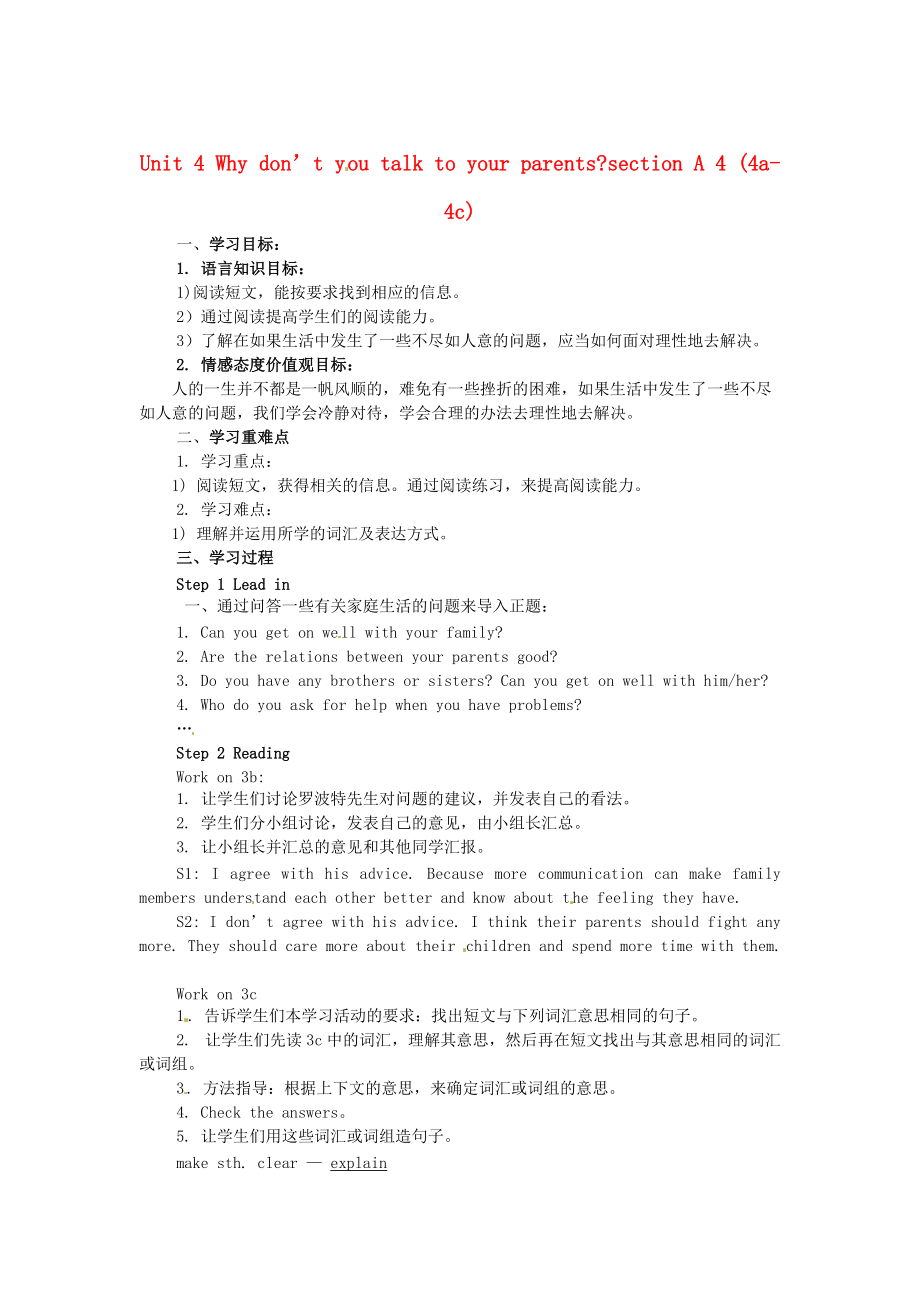《【人教版新目標(biāo)】八年級(jí)英語(yǔ)下冊(cè)Unit 4 Why don’t y ou talk to your parentssection A 4 (4a4c)》由會(huì)員分享,可在線(xiàn)閱讀�,更多相關(guān)《【人教版新目標(biāo)】八年級(jí)英語(yǔ)下冊(cè)Unit 4 Why don’t y ou talk to your parentssection A 4 (4a4c)(2頁(yè)珍藏版)》請(qǐng)?jiān)谘b配圖網(wǎng)上搜索。
1����、 精品資料
Unit 4 Why don’t you talk to your parents?section A 4 (4a-4c)
一、學(xué)習(xí)目標(biāo):
1. 語(yǔ)言知識(shí)目標(biāo):
1)閱讀短文�����,能按要求找到相應(yīng)的信息�����。
2)通過(guò)閱讀提高學(xué)生們的閱讀能力�。
3)了解在如果生活中發(fā)生了一些不盡如人意的問(wèn)題,應(yīng)當(dāng)如何面對(duì)理性地去解決��。
2. 情感態(tài)度價(jià)值觀(guān)目標(biāo):
人的一生并不都是一帆風(fēng)順的,難免有一些挫折的困難�����,如果生活中發(fā)生了一些不盡如人意的問(wèn)題�����,我們學(xué)會(huì)冷靜對(duì)待���,學(xué)會(huì)合理的辦法去理性地去解決。
二��、學(xué)習(xí)重難點(diǎn)
1. 學(xué)習(xí)重點(diǎn)
2�、:
1) 閱讀短文,獲得相關(guān)的信息�。通過(guò)閱讀練習(xí),來(lái)提高閱讀能力��。
2. 學(xué)習(xí)難點(diǎn):
1) 理解并運(yùn)用所學(xué)的詞匯及表達(dá)方式���。
三�、學(xué)習(xí)過(guò)程
Step 1 Lead in
一�����、通過(guò)問(wèn)答一些有關(guān)家庭生活的問(wèn)題來(lái)導(dǎo)入正題:
1. Can you get on well with your family?
2. Are the relations between your parents good?
3. Do you have any brothers or sisters? Can you get on well with him/her?
4. Who do you ask
3、 for help when you have problems?
…
Step 2 Reading
Work on 3b:
1. 讓學(xué)生們討論羅波特先生對(duì)問(wèn)題的建議�,并發(fā)表自己的看法。
2. 學(xué)生們分小組討論�,發(fā)表自己的意見(jiàn),由小組長(zhǎng)匯總��。
3. 讓小組長(zhǎng)并匯總的意見(jiàn)和其他同學(xué)匯報(bào)�����。
S1: I agree with his advice. Because more communication can make family members understand each other better and know about the feeling they have.
4�����、
S2: I don’t agree with his advice. I think their parents should fight any more. They should care more about their children and spend more time with them.
Work on 3c
1. 告訴學(xué)生們本學(xué)習(xí)活動(dòng)的要求:找出短文與下列詞匯意思相同的句子�。
2. 讓學(xué)生們先讀3c中的詞匯,理解其意思����,然后再在短文找出與其意思相同的詞匯或詞組。
3. 方法指導(dǎo):根據(jù)上下文的意思����,來(lái)確定詞匯或詞組的意思。
4. Check the an
5、swers��。
5. 讓學(xué)生們用這些詞匯或詞組造句子��。
make sth. clear — explain
Can you explain to me how to do this math problem?
talk — _____________ __________________________________
not allow — _______ __________________________________
worried — ________ __________________________________
get along with — _
6���、___________________________________________
Step 3 Language points
1. My problem is that I can’t get on with my family.
get on with 和睦相處;關(guān)系良好 相當(dāng)于 get along with
e.g. The child doesn’t get on well with others. 那個(gè)小孩不合群����。
2. Instead he watches whatever he wants until late at night.
1) instead adv. 代替;反而��;卻
e.g. If we can’t go to Huashan Mountain, we’ll go to the city of Xi’an for the trip.
如果我們不能去爬華山�����,我們就去西安游玩�。
辨析:
instead 是副詞,常置于句子末尾����。
Step 4 Homework
1. Read the article several times after school.
 【人教版新目標(biāo)】八年級(jí)英語(yǔ)下冊(cè)Unit 4 Why don’t y ou talk to your parentssection A 4 (4a4c)
【人教版新目標(biāo)】八年級(jí)英語(yǔ)下冊(cè)Unit 4 Why don’t y ou talk to your parentssection A 4 (4a4c)

